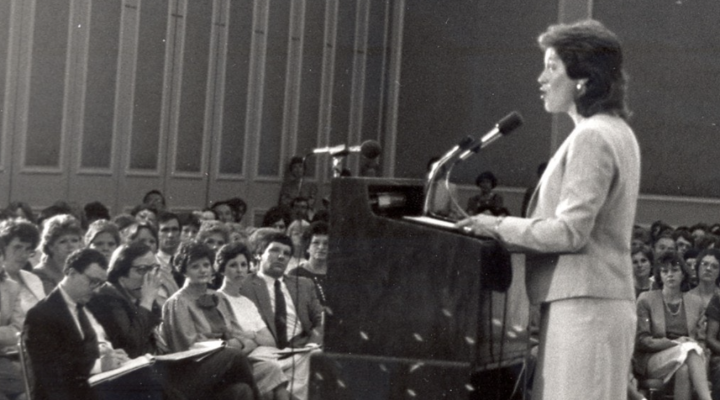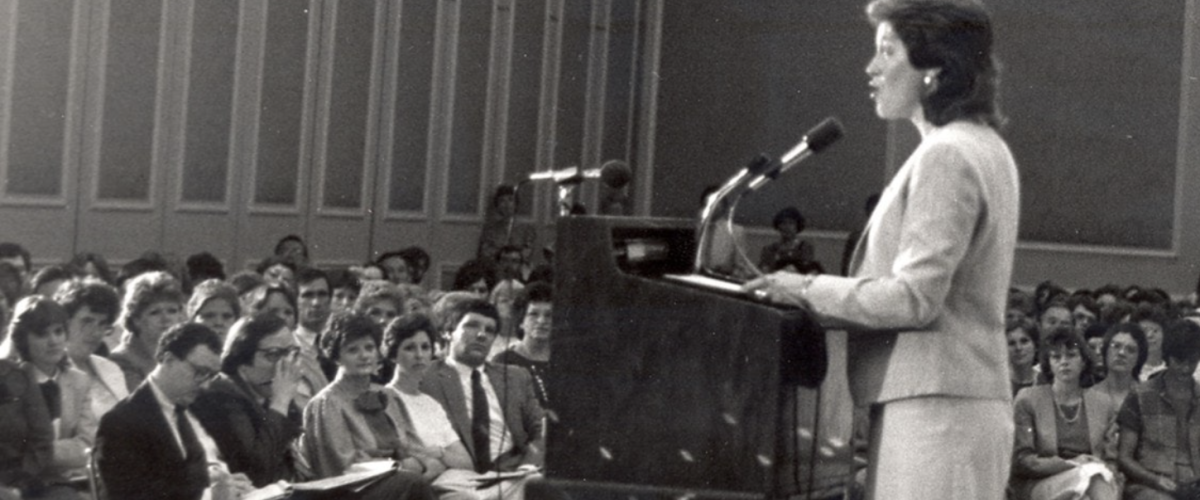At age 12, Molly Marshall’s pastor asked if she’d ever considered working with young people as a career option. She thought to herself, “Well of course I haven’t, I am one!”
Two years later, at age 14, while at a camp, she felt a beckoning into ministry.
Marshall began her career as a youth minister, living out this prophetic question. “I thought it would be youth ministry forever; junior-high lock-ins ’til Jesus comes,” she said.
But real life has moved the Oklahoma native through different modes of ministry and academic pursuits.
Finding a way through seminary
In her recent BNG article, “The Blessing of Provocation,” she talks about how her experience at Southern Baptist Theological Seminary helped her integrate her reading of Scripture with her clear sense of calling, aiding in her discernment process.
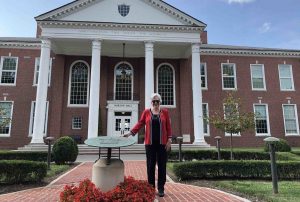
Molly Marshall outside Norton Hall at Southern Baptist Theological Seminary (Photo courtesy of Good Faith Media)
When asked about her experience in seminary, Marshall said a number of the men at seminary did not believe women could do ministry, a view shared by a number of faculty members. However, as she continued her studies, she learned to “challenge assumptions, read Scriptures more fully, and claim (my) rightful place” as a woman called and gifted to do God’s work in nontraditional ministry.
Between completing a master of divinity degree and Ph.D. work, she began to see obstacles women were facing and thought it was “not really going to get better for women until the seminary begins to think differently about the role of women in ministry.”
As Marshall was exploring Ph.D. programs, she chose Southern Seminary because she aimed to be the first woman hired in their School of Theology. And she was. Marshall graduated in December 1983 and was hired just a month later in January 1984.
Two professors made specific contributions to her discernment of calling in the academic realm: Daniel Aleshire and Andy Lester. She and Lester taught a course together on the women’s movement and pastoral care.
There were “no role models who were female,” Marshall said, so she became the first one. In fact, there were only two other female students pursuing the Ph.D. in theology at Southern while she was there.
The prophetic witness of daughters
Asked what it means to be a woman doing ministry and the importance of emphasizing one’s female identity as someone who has been called upon by God, she replied: “It has to do with the imaging of God. Males are no more suitable than are women” to bear the image of God.
“The church needs the prophetic witness of its daughters.”
“The church needs the prophetic witness of its daughters,” and the “presence of women as leaders in congregations is empowering to both men and women,” she said. Marshall believes allowing both women and men to hold leadership roles in the church helps everyone “rethink the projections we have about the image of God.”
Given all the work that she has done to fight against patriarchy in the church, when asked if she thinks women have reached full acceptance in all forms of ministry, Marshall quickly shook her head no. She believes the work has been meaningful and has allowed for great strides in the context of Baptist history, but Baptists are not yet done with this work.
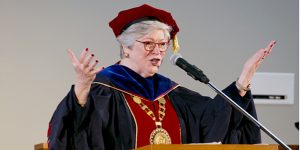
Molly Marshall
Only 6.5% of Cooperative Baptist Fellowship churches have called women as senior ministers, she noted, and this statistic indicates “that there is a great deal of skepticism even yet about the capacity of women to serve as the lead pastor or the senior minister.”
Although it may seem the odds are stacked against women in ministry, it is important to continue doing work to take down patriarchal notions that prevent women from reaching full acceptance, Marshall said. “It makes us more human” to do so as we “begin to understand the egalitarian impulse of the gospel.”
Treating students justly
A former youth minister, campus minister, professor and now the president of United Theological Seminary of the Twin Cities, Marshall has had ample opportunities to minister in a variety of both spiritual and academic ways.
Her priority always has been and always will be to “treat students justly and with respect” even if they disagree with her, she said. Marshall never responds to a student with contempt or shame, even if they treat her badly. Rather, she likes to “practice justice and egalitarian approaches” in the classroom and has “interrogated the received tradition for the ways in which it has elevated men to the diminishment of women.”
“Students may not remember the particularities of what they have been taught, but they will remember who treated them with compassion and care.”
This work is best shown in the ways a professor conducts their classroom, not just the content of their lectures, she said. “Students may not remember the particularities of what they have been taught, but they will remember who treated them with compassion and care.”
For her, the most exhilarating part about teaching is “seeing a student come to a new insight and for that insight to be liberating” by the discovery that there is “a gracious providence here at work and it includes me.”
What is ‘struggling to be born’
She told of an experience when she taught a class of all women for the Women’s Leadership Initiative in Nashville. She was inspired by the curiosity of these women who “asked questions they never would have asked had there been men in the room.” Marshall created for these women a learning space where they could ask questions that “peer beneath the surface and go to a deeper place,” creating the “opportunity for constructive reflection” in which their conversations with one another allowed them to “stretch traditional interpretation and ask why.”
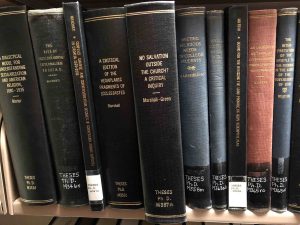
(Photo courtesy of Good Faith Media)
The most rewarding part of her ministry and teaching experiences has been to “encourage what I see struggling to be born,” she said. It is not easy to go to seminary, having to deconstruct and reconstruct ideas that you grew up learning, she explained.
Thus, Marshall considers herself a “midwife of grace” as she is a leader, but also an intellectual companion with students as they explore their individual callings and struggles in seminary.
What would her 14-year-old self have thought if she saw where she is now? “It would have scared her to death!”
“Be of good courage. It’s gonna cost. It’s gonna cost to follow the calling, but it will be worth it.”
Her younger self could not have dreamed of all the progress made for women in the church. Knowing now the struggles she has faced, she would tell herself to “be of good courage. It’s gonna cost. It’s gonna cost to follow the calling, but it will be worth it.”
The work is not yet done
Reflecting again on her decision to complete her Ph.D. at Southern, she explained that she had been accepted at Cambridge as well, which would have opened up different doors for her professional career. However, she felt at the time she was able to be a “pioneering figure” for Baptist women and wanted to do more for the Baptist world by staying closer to home.
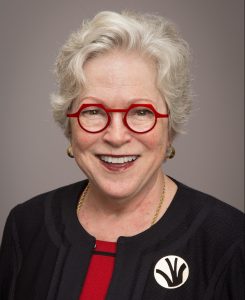
Molly Marshall
Now, looking forward for Baptist women, Marshall thinks women “ought to be open to creating something new” as they explore their callings. Rather than viewing a calling as one particular end goal or answer, women should make efforts to pursue what they perceive their callings to be, but also be willing to be flexible.
The work is not yet done, and the fight toward a better future may lead somewhere unexpected, she advised.
She has met two or three times a year with the same five women in theological education for more than a dozen years, and it has “been a marvelous form of support” throughout her journey.
Which leads to some advice for other women in ministry: “Find a network of supportive sisters, because it’s just too hard to try to do it by yourself.”
Learn more about Molly Marshall’s life and ministry at the Good Faith Media podcast “Brother Molly.”
Mallory Challis is a senior at Wingate University and serves this semester as BNG’s Clemons Fellow.
Related articles:
Women in ministry: Strategically silent? | Opinion by Melody Maxwell
Jesus calls women to ministry by name and asks them to rise up, Stewart says in fiery BWIM sermon
Annual report on Baptist women in ministry finds some gains but serious losses due to COVID

